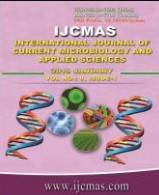


 National Academy of Agricultural Sciences (NAAS)
National Academy of Agricultural Sciences (NAAS)

|
PRINT ISSN : 2319-7692
Online ISSN : 2319-7706 Issues : 12 per year Publisher : Excellent Publishers Email : editorijcmas@gmail.com / submit@ijcmas.com Editor-in-chief: Dr.M.Prakash Index Copernicus ICV 2018: 95.39 NAAS RATING 2020: 5.38 |
Cytoplasmic-genic male sterile based F1 hybrid is a revolutionary approach to break yield stagnation in pigeonpea. Hybrid vigor is positively correlated to genetic distance and allelic divergence of the parents. This study estimated genetic divergence of 8 ‘A’ lines, 2 ‘B’ lines and 19 ‘R’ lines of A2 and A4 cytoplasmic sources, and predicted best parental combinations using molecular markers. Among 390 EST-SSR markers screened, only 60 markers found polymorphic indicating very low degree of polymorphism (15.4%). Average allelic count was 2.26 with a range of 2-4 per loci. Mean PIC was 0.358 with a range of 0.5885 (ASSR236) and 0.1780 (ASSR9). Cluster and factorial analyses were performed based on marker dissimilarity matrix. The best parental combinations identified from the present study were, ICPA2047 X ICPR4013; ICPA2043 X ICPR4013 for A4 cytoplasm, and GT290A X GTR9, GT33A X GTR9, MS01A X GTR 9, MS10A X GTR9 for A2 cytoplasm in pigeonpea.
 |
 |
 |
 |
 |